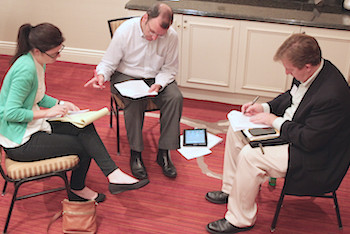
CREC staff
 |
Bob Isaacson Senior Vice President for Economic Research and Policy bisaacson@crec.net |
Bob Isaacson recently joined Center for Regional Economic Competitiveness (CREC) to manage the Federal-state economic development partnership practice and will serve as a Senior Vice President. With more than 30 years of local, state and Federal government experience, he is a proven leader driven by strategy and data with diverse economic/workforce development experience in finance, research/analysis and marketing. Bob is noted for inclusive partnerships, collaborative initiatives and the use of innovative techniques to meet the needs of businesses, communities and workers and has receive multiple state and national awards for his work.
Prior to joining CREC, he most recently served as Executive Director of the Office of Business Finance for the Minnesota Department of Employment and Economic Development (DEED). His team fueled business investment and job creation through loans, grants and tax credits awarding more than $100 million in 2020 often in partnership with local and federal assistance. He led the development and implementation of several new nationally recognized programs including the Angel Loan Fund, Angel Tax Credits (early stage), Emerging Entrepreneur Fund (underserved communities) and the Job Creation Fund (performance based). He also led the development of three new programs to respond to businesses under distress due to the impacts of the COVID-10 pandemic.
Bob is skilled at working with stakeholders to identify the business trends that policies and programs can effectively address. He also uses his research and evaluation experience to measure program outcomes and improve performance which helped Minnesota receive national recognition including the 3rd best performance for serving underserved populations in through State Small Business Credit Initiative (SSBCI) programs.
Bob also served as the Executive Director of the Minnesota Agricultural and Economic Development Board during his time with DEED. As a statewide issuer, the Board participated in projects with conduit bond issues valued at more than $200 million. As Executive Director, he also established a unique disaster recovery program that provided quick start-up grants to businesses affected by natural disasters.
Bob was also the inaugural director in DEED’s Communication, Analysis and Research Division (CARD) where he led 50 talented LMI researchers, economic analysts, marketing staff and program evaluators. As Division Director, he ensured marketing products were tailored for diverse businesses and met needs of workforce, business and community development staff. He also oversaw the development of partnerships to fund marketing campaigns using Google and Facebook, and such research projects as the economic impact of snowmobiling (University of Minnesota Tourism Center), business climate analyses (Xcel Power), economic updates (Federal Reserve), the state of manufacturing and linkages between metro and rural areas (Enterprise Minnesota – a Manufacturing Extension Partnership member). He also served on several interagency committees to identify best practice solutions for such issues as business freight, workforce information, sustainability and competitiveness.
Mr. Isaacson has also served in various leadership and analyst roles with the U.S. House Agriculture Committee, Government Accountability Office, the Minnesota Department of Trade and Economic Development, and the City of Minneapolis. His work covered a variety of topics including business start-up success, business costs, Minnesota’s defense industry, productivity, trade statistics, waste disposal and the nation’s dairy industry. These analyses led to programmatic changes and state/federal legislation.
Bob has served on a variety of initiatives related to his experiences which inform his CREC work:
- Board of Directors and Board chair for the Council of Development Finance Agencies (CDFA)
- Loan Participation Program – Best Practices Working Group for the U.S. Department of Treasury’s State Small Business Credit Initiative
- Member Services Committee, Economic Development Association of Minnesota
- Board of Directors and Board chair for the Council for Community and Economic Research (C2ER)
Bob has a M.A. in Public Policy from the Humphrey School at the University of Minnesota (U of M) with an emphasis on education and economic development and a B.A. in Political Science from the U of M.
